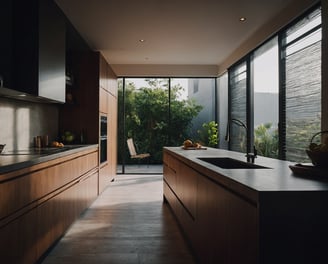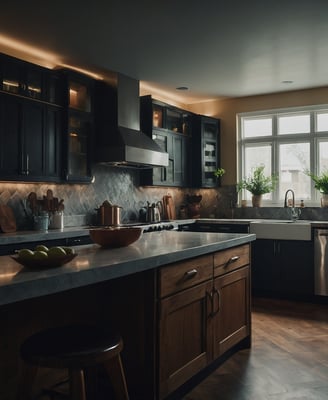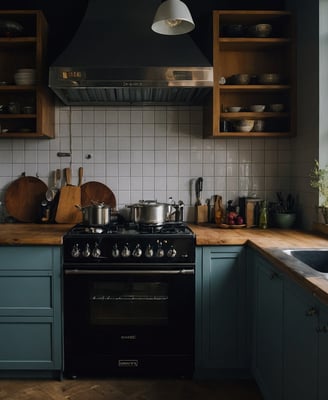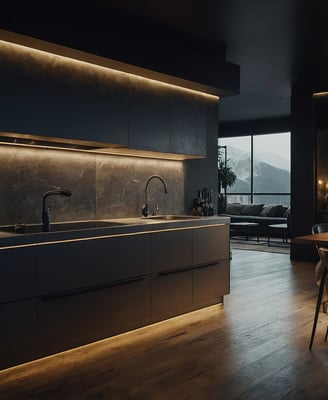A Comprehensive Guide to Choosing the Right Flooring for Your Kitchen
Picking the perfect kitchen flooring can be a game-changer. Imagine sleek tiles, easy to clean after cooking up a storm, versus worn-out linoleum that's seen better days. The right choice sets the stage for your culinary adventures - think durability and style in one package. It's all about finding that sweet spot between functionality and aesthetics. Picture this: seamless hardwood exuding warmth or practical vinyl offering fuss-free maintenance. Your decision impacts not just the look but also how you feel in your cooking haven.
2/2/202410 min read


Picking the perfect kitchen flooring can be a game-changer. Imagine sleek tiles, easy to clean after cooking up a storm, versus worn-out linoleum that's seen better days. The right choice sets the stage for your culinary adventures - think durability and style in one package.
It's all about finding that sweet spot between functionality and aesthetics. Picture this: seamless hardwood exuding warmth or practical vinyl offering fuss-free maintenance. Your decision impacts not just the look but also how you feel in your cooking haven.
Factors to Consider When Choosing Kitchen Floors
Traffic and Usage Patterns
When selecting flooring for your kitchen, consider the amount of foot traffic and usage patterns. For high-traffic kitchens, durable materials like ceramic tile or vinyl are ideal. These options can withstand frequent use without showing signs of wear quickly. On the other hand, for kitchens with less activity, laminate or hardwood floors could be suitable choices as they offer a balance between durability and aesthetics.
Consider how often your kitchen is used daily - do you have a large family bustling in and out all day long? If so, opt for flooring that can handle heavy use without losing its appearance quickly.
Pros: Durability in high-traffic areas
Cons: Costlier than less durable options
Durability of Flooring Material
The durability of the flooring choice is crucialStains, and heat. Materials like porcelain tile or natural stone are highly durable options that resist scratches and moisture damage well. Moreover, these materials are also heat-resistant which is beneficial in a space where cooking activities generate warmth.
Imagine dropping heavy pots or pans on your kitchen floor - would you want a material that easily chips or one that can withstand such impacts?
Key Information: Choose scratch-resistant materials
List of Examples: Porcelain tile, natural stone
Ease of Cleaning and Maintenance
Another vital aspect to consider when choosing kitchen floors is how easy they are to clean and maintain. Opt for flooring materials that are stain-resistant and require minimal upkeep such as luxury vinyl planks or ceramic tiles. These surfaces can be effortlessly wiped clean from spills or splatters commonly found in kitchens.
Think about the time you spend cleaning your current kitchen floor - would you prefer something low-maintenance that doesn't require frequent scrubbing?
Benefits of Choosing the Right Kitchen Flooring
Enhanced Aesthetics
Selecting good choice flooring for your kitchen can significantly improve its overall look. Whether you opt for sleek tiles, warm hardwood, or durable laminate, the right flooring can elevate your kitchen's aesthetic appeal. For instance, a light-colored tile floor can make a small kitchen appear more spacious and bright.
Choosing the correct flooring material is crucial in maintaining and even increasing your home's value. Quality flooring not only enhances the visual appeal of your kitchen but also adds to the overall value of your property. Investing in high-quality materials like natural stone or premium hardwood floors can attract potential buyers if you decide to sell your home in the future.
Comfort and Safety
Opting for suitable kitchen flooring ensures that you have a comfortable and safe surface while cooking or cleaning. For example, cushioned vinyl or cork floors provide a softer feel underfoot compared to hard surfaces like ceramic tiles. This feature is particularly beneficial if you spend long hours standing in the kitchen preparing meals.
Pros:
Enhances aesthetics
Increases home value
Provides comfort and safety
Cons:
Costly investment initially
Budget Considerations for Kitchen Flooring
Varying Price Ranges
Kitchen flooring materials span a wide range of prices. From affordable vinyl to high-end hardwood, the cost can significantly vary. Budget plays a crucial role in determining the type of flooring you choose for your kitchen.
Researching different options and comparing prices are essential steps in finding an affordable kitchen flooring solution. Understanding the price ranges of materials like laminate, tile, or engineered wood can help you make an informed decision based on your budget constraints.
Long-Term Costs
When considering cost, it's not just about the initial purchase price but also the long-term expenses associated with maintenance and potential replacement. For instance, while hardwood floors might have a higher upfront cost, they are durable and may require less frequent replacement compared to cheaper alternatives like vinyl.
Pros:
Allows you to find a suitable option within your budget


Best Kitchen Flooring Options Overview
Tile Flooring
Tile flooring is a top choice for kitchen floors. It's known for its durability and comes in various design options, making it a good option for those seeking both functionality and style. With tile flooring, you can find materials that offer water resistance, an essential feature in kitchens prone to spills and splashes. Tiles are easy to clean, which is advantageous when considering the maintenance of your kitchen floor.
One key advantage of tile flooring is its versatility in design. You can opt for sleek modern tiles or go for a more rustic look with textured options like terracotta or slate. This variety allows you to customize your kitchen flooring to match your preferred aesthetic.
Pros:
Durable
Wide range of design options
Water-resistant
Cons:
Cold underfoot
Grout lines may require regular cleaning
Vinyl Flooring
Vinyl flooring is another popular choice due to its affordability and water resistance properties—ideal features for busy kitchen spaces where spills are common occurrences. Installation of vinyl flooring is relatively simple compared to other materials, making it a good option if you're looking for a quick upgrade without extensive renovation work.
When considering vinyl flooring as an option, keep in mind that advancements in technology have led to more realistic designs mimicking natural materials like wood or stone at a fraction of the cost. This makes vinyl an attractive choice not only for budget-conscious homeowners but also those who desire the look of hardwood or tile without the associated price tag.
Pros:
Affordable
Water-resistant
Easy installation
Cons:
Prone to scratching
May show wear over time
Hardwood Flooring
For homeowners seeking timeless elegance in their kitchens, hardwood flooring remains a sought-after option despite requiring more maintenance than other materials. The warm and inviting look offered by hardwood floors adds charm and value to any home; however, precautions need be taken against moisture exposure as excessive water can damage wood surfaces over time.
Hardwood floors are renowned for their enduring appeal—a quality that transcends trends and advertisements promoting alternative materials such as laminate or engineered wood products designed to mimic hardwood's classic appearance while offering increased durability.
Pros:
Timeless elegance
Adds value
Warm & inviting look
Durability and Water Resistance in Kitchen Flooring
Porcelain Tile
Porcelain tile is a popular flooring material for kitchens due to its exceptional durability and stain resistance. It is perfect for high-traffic areas, ensuring longevity even with constant use. This type of flooring can withstand spills and stains common in kitchen environments, making it easy to clean and maintain.
Porcelain tile offers remarkable water resistance, keeping your kitchen floor safe from moisture damage. Its impermeable nature prevents water from seeping through, protecting the subfloor underneath. With a wide range of designs available, you can choose porcelain tiles that mimic natural materials like wood or stone without compromising on durability.
Laminate Flooring
Laminate flooring is another option known for its decent water resistance properties suitable for kitchens. While laminate can handle everyday spills and splashes well, prolonged exposure to excessive moisture may cause damage over time. Despite this drawback, laminate remains a cost-effective choice that provides good durability under regular wear and tear conditions.
When considering laminate flooring for your kitchen, opt for higher quality options with enhanced water-resistant features to ensure better performance against liquid mishaps. However, keep in mind that standing water should be promptly cleaned up to prevent any potential issues with the floor's integrity.
Engineered Hardwood
Engineered hardwood stands out as an excellent compromise between natural hardwood beauty and practicality in kitchens where moisture levels fluctuate frequently. Unlike traditional solid wood floors that may warp or cup when exposed to moisture, engineered hardwood offers improved water resistance, making it a suitable alternative.
With its multi-layer construction designed to combat humidity changes effectively, engineered hardwood can maintain its appearance without significant expansion or contraction due to varying moisture levels typical in kitchens. This makes it an ideal choice if you desire the elegance of hardwood floors but require additional protection against potential water-related damages.
Stylistic Considerations for Kitchen Flooring
Light vs. Dark Flooring
Light-colored flooring can make small kitchens feel more spacious, while dark-colored flooring adds a cozy and inviting ambiance to the space. For example, light wood or tile floors in a pale shade like white or beige can give the illusion of a larger kitchen, perfect for tight spaces.
Dark flooring such as rich brown hardwood or deep grey tiles can create a sense of warmth and depth in your kitchen. Imagine how elegant dark slate would look against crisp white cabinets - it's all about creating contrast and visual interest.
Adding Visual Interest with Patterns
Consider incorporating patterned tiles or unique designs into your kitchen flooring to inject personality and style into the room. Geometric patterns, intricate mosaics, or even playful motifs can transform an ordinary floor into a stunning focal point that reflects your taste.
By selecting flooring with eye-catching patterns that resonate with your overall design aesthetic, you elevate the entire look of your kitchen. Picture sleek contemporary cabinets paired with geometric black-and-white tiled floors - it's all about making a statement through design cohesion.
Coordinating with Cabinets and Countertops
Choosing flooring that complements your existing kitchen cabinets and countertops is crucial for achieving a cohesive design scheme. Opt for neutral backdrops like grey stone or light wood that seamlessly blend with various cabinet finishes such as oak, cherry, or painted white.
When the colors and textures of your flooring, cabinets, and countertops harmonize effortlessly, they work together to enhance the overall look of your kitchen space. Imagine how sleek stainless steel appliances would pop against neutral-toned floors complemented by matching cabinetry - it's all about creating balance in design elements.


Cleaning and Maintenance of Kitchen Floors
Regular Cleaning Routine
To maintain your kitchen floors, regular cleaning is crucial. Sweep or vacuum frequently to eliminate dirt and debris that can accumulate on kitchen floors. By doing this simple task regularly, you can prevent scratches and damage caused by particles being ground into the floor's surface.
It's essential to address spills promptly to avoid stains setting in. Wipe up any spills immediately with a damp cloth or mop to prevent them from seeping into the flooring material. This quick action can help preserve the integrity of your new floors and prevent long-term damage.
Proper Care for Different Flooring Materials
Different types of flooring materials require specific care routines. For instance, ceramic tile floors may need periodic sealing to protect their appearance and ensure longevity. By following manufacturer recommendations for sealing intervals, you can keep your tile floors looking pristine.
Opt for gentle solutions that won't harm your kitchen floor's finish. Avoid using abrasive cleaners or tools that could scratch or wear down the flooring material over time. By choosing mild cleansers specifically designed for your type of flooring, you'll effectively remove dirt without causing damage.
DIY vs Professional Installation of Kitchen Floors
Cost and Effort
DIY installation of kitchen floors can be cost-effective, saving money on labor costs. However, it may demand more time and effort, especially when dealing with complex flooring materials like natural stone tiles that require precision.
Installing the kitchen floor professionally ensures accurate measurements, proper leveling, and seamless transitions between different areas. While this option might be pricier due to labor costs, it guarantees a high-quality finish without the hassle of tackling challenging installations yourself.
Flooring Materials
Some flooring materials are more suitable for DIY installation than others. For instance, sheet vinyl is often considered a beginner-friendly option due to its flexibility and ease of cutting. On the other hand, intricate materials like natural stone tiles or hardwood may pose challenges best handled by professionals to ensure a flawless outcome.
Pros of DIY Installation:
Cost-effective
Flexibility in scheduling
Cons of DIY Installation:
Time-consuming
Potential for errors
Key Information:
Professional installation guarantees precision and quality.
When deciding between DIY and professional installation for your kitchen floors, consider factors such as your budget, time availability, complexity of the material chosen, and desired outcome. While taking on a DIY project can be rewarding in terms of cost savings and personal accomplishment if done correctly; however getting professional help ensures a stress-free experience with expert results.
Determining the Best Kitchen Floors for Your Needs
Lifestyle and Priorities
When choosing the right flooring for your kitchen, it's crucial to consider your lifestyle. Do you have a busy household with kids and pets? If so, prioritize durability to withstand heavy foot traffic and potential spills. Maintenance is another key factor; some materials require more upkeep than others. Aesthetics play a significant role as well - you want your kitchen floor to complement your overall kitchen design.
To ensure that your choice aligns with both practicality and style, assess the level of foot traffic in your kitchen. For high-traffic areas, opt for resilient materials like tile or hardwood that can handle constant use without showing wear quickly. On the other hand, if foot traffic is minimal, you may have more flexibility in choosing a material based on aesthetics rather than just durability.
Professional Consultation
Consulting with flooring experts or contractors can provide invaluable insights tailored to your specific needs. These professionals can guide you through various options based on factors like square footage, desired maintenance level, exposure to direct sunlight (which can affect certain materials), and preferred colors or textures that match your kitchen design aesthetic.
Pros:
Expert advice tailored to individual needs.
Access to a wide range of products and materials suited for kitchens.
Recommendations based on factors such as maintenance requirements and durability.
Cons:
Additional cost associated with professional consultation.
Limited by budget constraints when selecting premium materials suggested by experts.
Frequently Asked Questions
What factors should I consider when choosing kitchen floors?
When choosing kitchen floors, consider factors like durability, water resistance, ease of maintenance, and aesthetic appeal. These aspects ensure your flooring can withstand the high traffic and spills common in kitchens while enhancing the overall look of the space.
Why is it important to choose the right kitchen flooring?
Choosing the right kitchen flooring is crucial because it impacts both the functionality and aesthetics of your space. The right flooring can withstand daily wear and tear, resist moisture buildup, complement your decor style, and increase your home's value.
How do budget considerations play a role in selecting kitchen flooring?
Budget considerations are essential when selecting kitchen flooring as they help determine which materials fit within your financial constraints. By setting a budget upfront, you can explore various options that offer a balance between cost-effectiveness and quality to meet your needs effectively.
Is DIY installation suitable for all types of kitchen floors?
DIY installation may be suitable for certain types of kitchen floors like vinyl planks or laminate tiles that are relatively easy to install. However, complex materials such as natural stone or hardwood may require professional installation to ensure proper fitting and longevity.
What are some stylistic considerations to keep in mind when choosing kitchen flooring?
Stylistic considerations include matching the flooring with your overall decor theme, considering color schemes that enhance light or create warmth in the space, evaluating texture for slip-resistance, and selecting patterns that complement cabinetry or countertops for a cohesive look.


